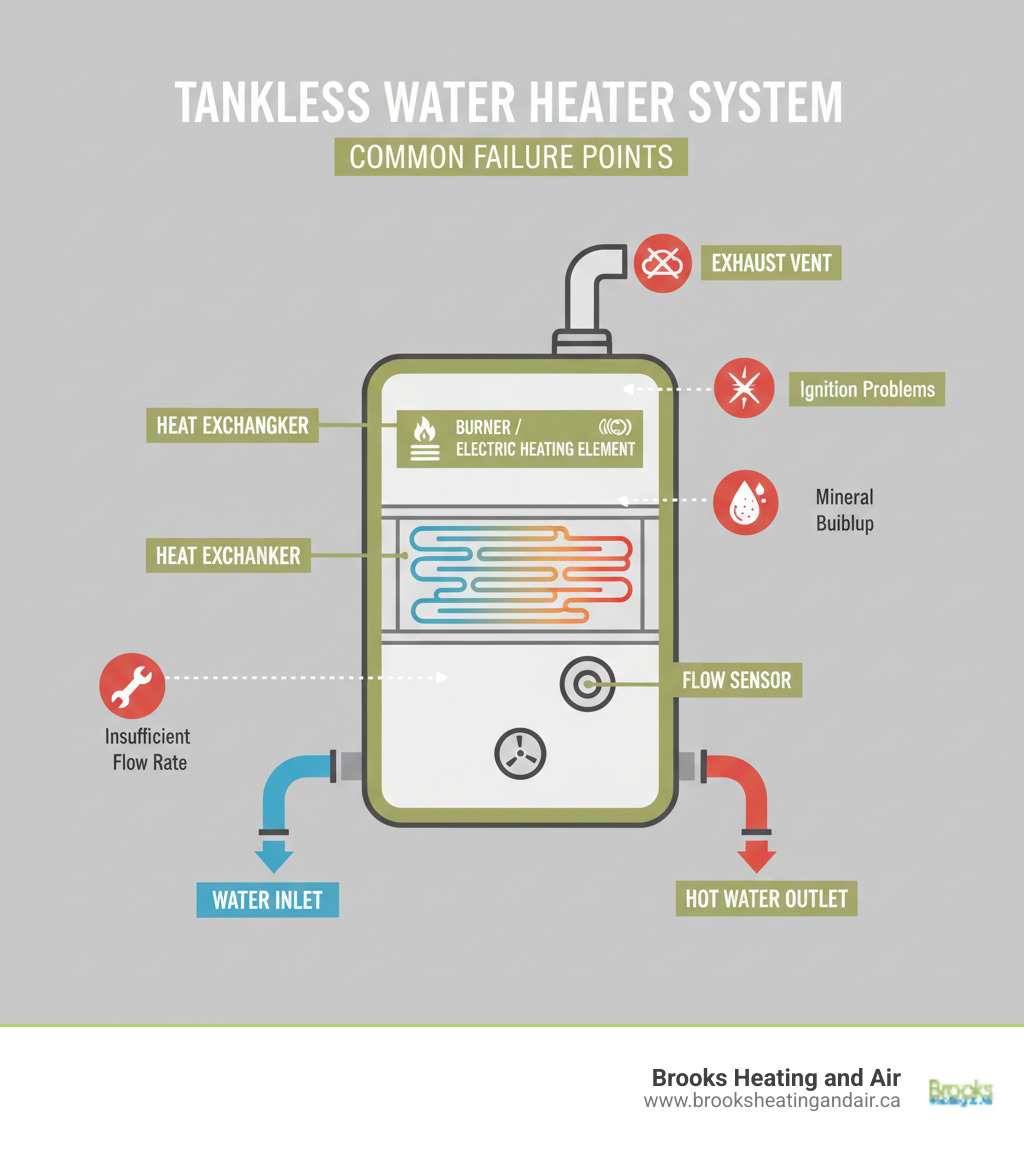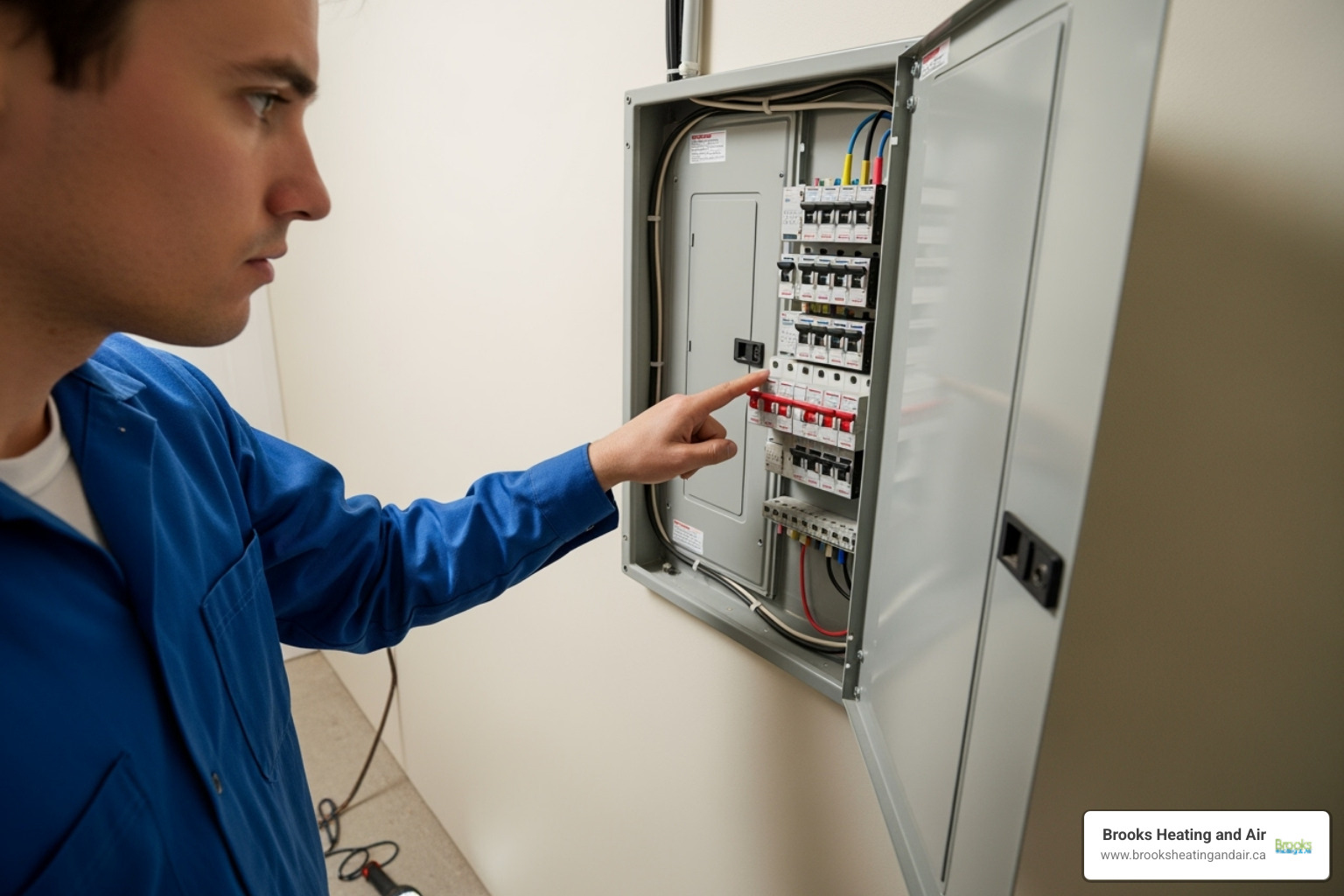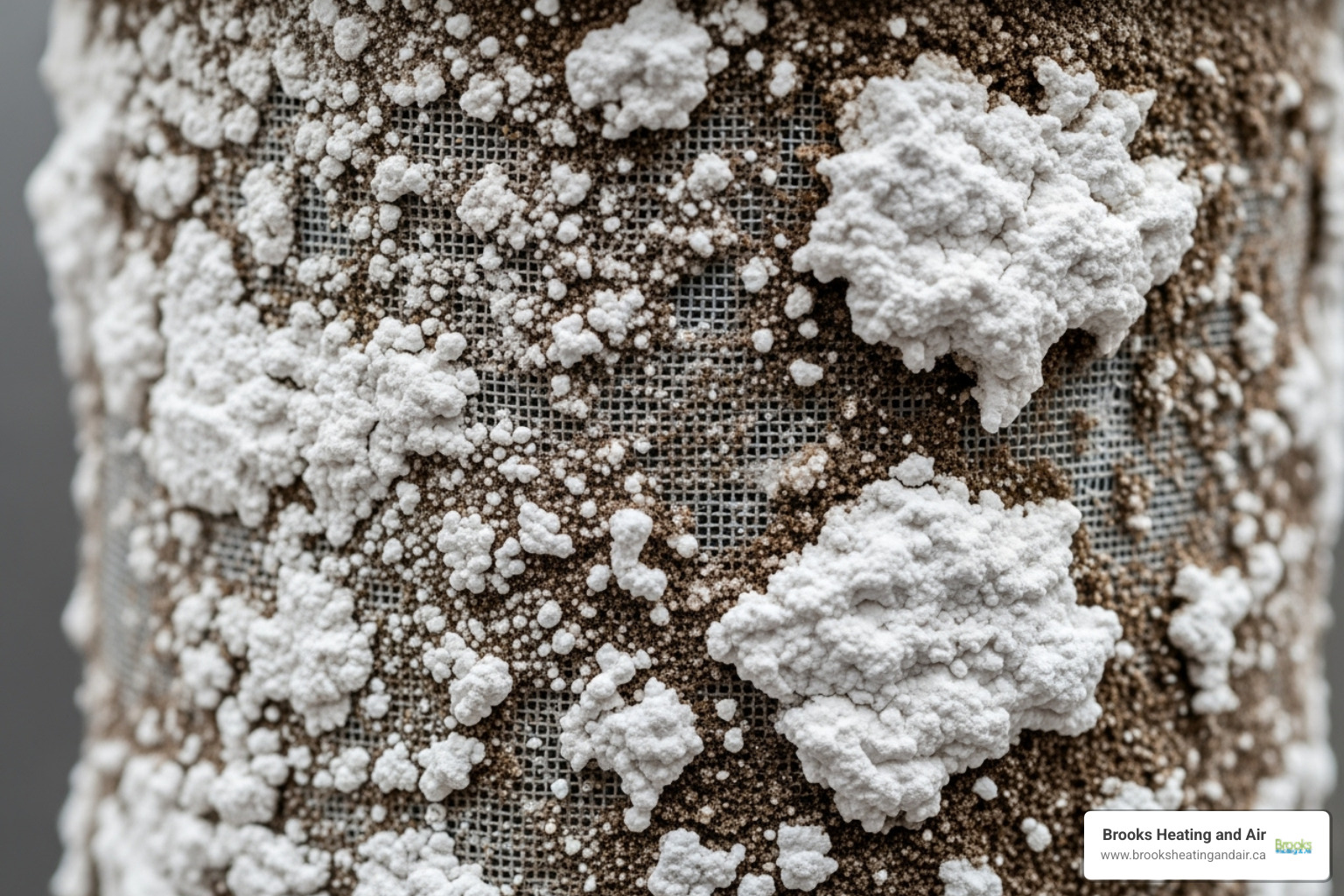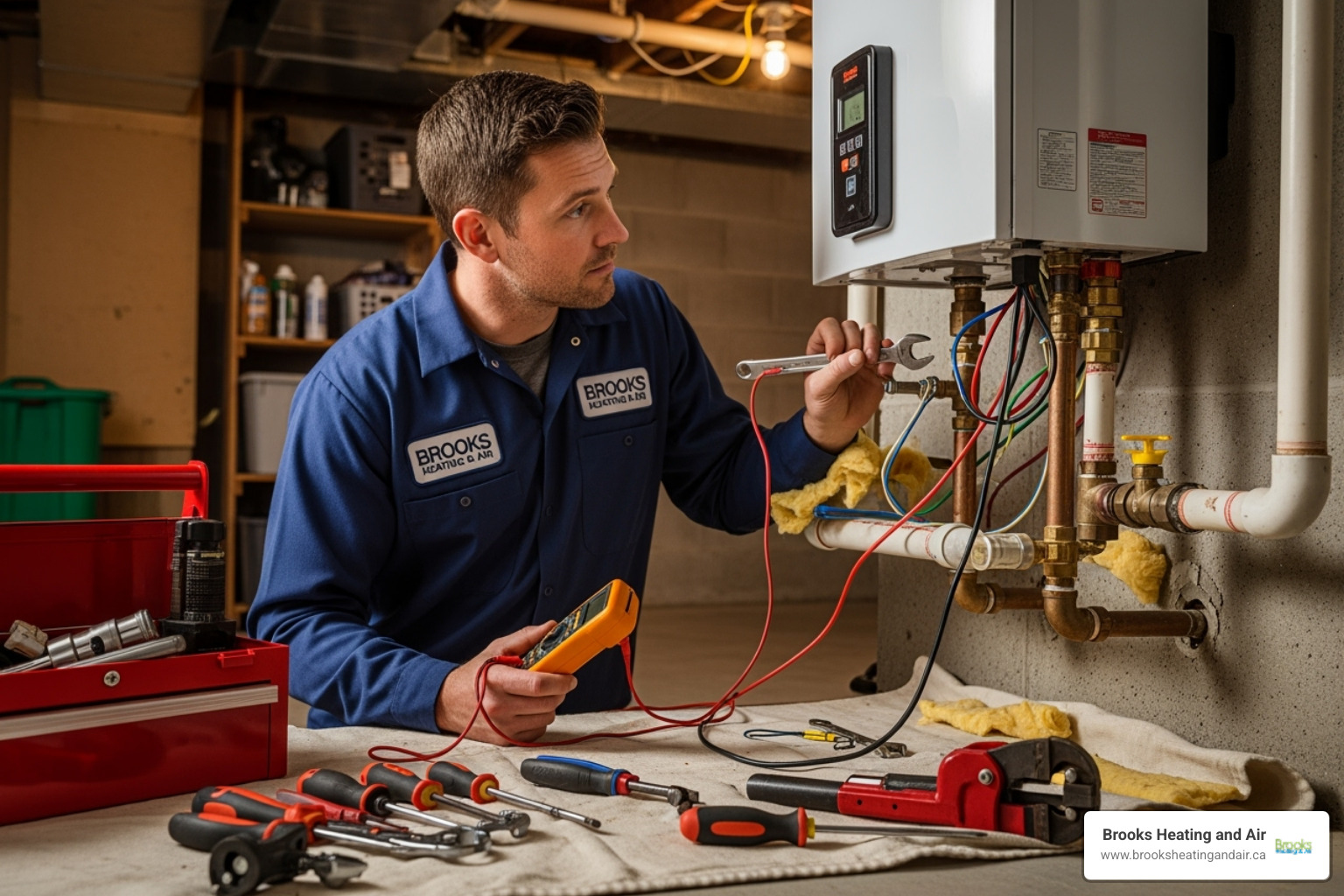No Hot Water? Here's What to Check When Your Tankless Heater Stops
Why Your Tankless Water Heater Not Working Requires Quick Action
A tankless water heater not working is a frustrating problem that interrupts your daily routine. No morning showers, no hot water for dishes, and no laundry. When your on-demand system fails, you need answers fast.
Quick troubleshooting checklist:
- Check your power supply - Verify the circuit breaker hasn't tripped (electric models) or gas valve is open (gas models).
- Inspect water flow - Ensure all water valves are fully open and check for adequate flow rate.
- Look for error codes - Most units display codes that identify specific problems.
- Verify gas supply - Confirm propane tanks aren't empty and gas lines are clear.
- Check for blockages - Inspect air intake and exhaust vents for debris or obstructions.
- Try a reset - Turn off power and water, wait 30 seconds, then restart the system.
Tankless water heaters are efficient, heating water only when you need it and eliminating the standby energy losses of traditional tanks. But this on-demand system relies on several components working together perfectly. A single failure can shut down the entire system.
The most common culprits are power interruptions, gas supply issues, mineral buildup from hard water, system overload, and blocked ventilation. Many of these problems have simple DIY fixes.
This guide provides systematic troubleshooting steps, from basic checks to more complex issues. You'll learn what to inspect, when a reset might work, and when it's time to call a professional.

Start with the Basics: Simple Checks Before You Panic
When your hot water disappears, don't assume the worst. Many tankless water heater problems have surprisingly simple solutions. Before calling for help, perform these basic checks.
The most common issues are a tripped breaker, a closed valve, or a system needing a reset. These are often quick fixes you can handle yourself.
Start by checking your power supply, gas supply (for gas models), and water valves. If your unit has a digital display, look for error codes. Your user manual contains model-specific information that can save you time and frustration.

Troubleshooting a Tankless Water Heater Not Working Due to Power Issues
No power means no hot water. Both electric and gas models require electricity to operate their controls.
For electric models, check the circuit breaker. A tripped breaker is a common reason for a tankless water heater not working. Find the breaker, flip it fully off, then back on.
If the breaker trips again immediately, stop. This indicates a serious electrical problem that requires a professional. Do not keep resetting it, as you could damage the unit or create a safety hazard.
Gas models also need electricity. Check that the power cord is plugged in and its circuit breaker hasn't tripped. It's an easy thing to overlook.
For the gas supply, ensure the valve to the unit is fully open (the handle should be parallel to the gas line). If you use propane, check your tank level. An empty tank is an easy fix that causes many unnecessary service calls.
How to Reset Your Tankless Water Heater
A tankless water heater's safety system can shut it down for various reasons. Even if the issue is temporary, the unit may stay off until you perform a reset.
When should you try a reset? A reset is appropriate after overheating, a power outage, or for certain error codes. It's also useful if the unit shut down due to a temporary issue, like low water pressure that has since been resolved.
Here’s how to reset your system safely:
- Turn off the power and water. For electric units, flip the breaker. For gas models, close the gas valve and unplug the unit. Then, close the cold water inlet valve.
- Wait about two minutes for the system to power down completely.
- Press the reset button (usually red) for three to five seconds. Check your manual if you can't find it.
- Restore power and water. Open the cold water inlet valve, then turn the power back on. For gas models, open the gas valve.
- Let the heater reboot. Listen for startup sounds and check the display for error codes. If it's clear, test the hot water.
Also, consider your temperature setting. Setting your unit to 120°F (49°C) is a good balance—it's hot enough for most needs while reducing energy use and mineral buildup. Learn how to set your water heater temperature safely to find the right balance for your home.
If these basic steps don't work, our team provides comprehensive water heater services in Georgetown and can diagnose issues that go beyond simple fixes.
Common Reasons a Tankless Water Heater is Not Working
If basic checks and a reset didn't solve the problem, your tankless water heater not working could be due to other common issues. Understanding these culprits can help you decide if it's a DIY fix or time to call a professional.
Here's a quick reference table showing the most frequent problems and their solutions:
| Problem | Likely Causes | Simple Solutions |
|---|---|---|
| No hot water or lukewarm water | System overload, low flow rate, power/gas issues, blocked vents, mineral buildup | Reduce simultaneous use, check power/gas connections, clear vents, flush system |
| Inconsistent temperature (hot/cold sandwich) | Flow rate fluctuations, dirty filter, residual cold water in pipes | Clean water filter, manage water flow, consider buffer tank |
| "No ignition" or "flame failure" error | Gas supply problems, faulty igniter, dirty flame sensor, blocked gas line | Check gas valves, inspect vents, call for professional diagnosis |
| Unit shuts off intermittently | Overheating, low water pressure, blocked vents, component failure | Reset unit, verify water pressure, clear obstructions, schedule inspection |
| Strange noises (banging, sputtering) | Mineral buildup, loose parts, high water pressure | Flush unit with descaling solution, tighten connections, check pressure |
System Overload: Too Much Demand
If the shower goes lukewarm while the dishwasher and laundry are running, your tankless water heater is likely experiencing system overload. Every unit has a maximum flow rate capacity (GPM). When you demand more hot water than it can produce, the temperature will drop.
A shower uses about 2.5 GPM, a dishwasher 1.5 GPM, and a washer 2.5 GPM. Running them all at once can easily exceed the capacity of a standard 7 GPM unit. Signs of overload include lukewarm water or alternating temperatures when multiple fixtures are running. This isn't a malfunction; the heater is just at its capacity.
The solution is to stagger your hot water usage or upgrade to a higher-capacity unit. If this is a recurring problem, your heater may be undersized. We can help you find the right size with our tankless water heater installation service.
Mineral & Sediment Buildup
Hard water is a major long-term threat to your tankless heater. It contains minerals like calcium and magnesium that form scale buildup inside the heat exchanger.

This scale acts as an insulator, forcing the unit to work harder and use more energy. This reduced efficiency leads to higher energy bills. You may also notice lower water pressure and inconsistent temperatures. If left unchecked, severe buildup can damage the heat exchanger, a costly but preventable repair.
This is manageable. Flushing the system annually with a descaling solution removes mineral deposits. For very hard water, flush every six months. A water softener is the best long-term solution. Regular maintenance extends your unit's lifespan and keeps it running efficiently.
What to Do When Your Tankless Water Heater is Not Working Because of Ignition Failure
For gas models, ignition failure is a common reason for no hot water. A "no ignition" or "flame failure" error code means the burner isn't lighting. Several issues can cause this. First, check for gas supply issues: ensure the gas valve is open and your propane tank isn't empty. Inadequate gas pressure can also be a factor.
The problem could also be a faulty igniter that no longer creates a spark, or a dirty flame sensor that can't detect the flame, causing a safety shutdown. A clogged gas line or burner can also block fuel flow and prevent ignition.
While you can check the gas valve, most ignition problems require a professional. Gas appliances can be hazardous, so improper repairs are risky. Our team specializes in safe tankless water heater repair.
Blocked Air Supply or Exhaust Vent
A gas tankless heater needs a steady supply of fresh air for combustion and a clear path to expel exhaust. A blockage in either the intake or exhaust vent will cause a safety shutdown. Modern units have safety features that detect poor ventilation, which can lead to inefficient combustion and dangerous carbon monoxide buildup. The sensors trigger an automatic shutdown to prevent this.
Common blockages include nests from birds and insects, leaves, debris, snow, or ice. Even items stored too close to an indoor vent can restrict airflow. Regular vent inspection is critical. Check your home's exterior vents for obstructions and ensure you maintain the clearance requirements listed in your owner's manual for safe operation.
You can remove simple external obstructions, but call a professional for suspected internal blockages. Improper vent repairs create serious safety risks.
Inconsistent Water Temperature: The "Cold Water Sandwich" Effect
If you get a sudden blast of cold water during a hot shower, you've experienced the "cold water sandwich" effect. This is a common characteristic of tankless heaters, not necessarily a malfunction. It happens when you briefly turn off the hot water. Residual water in pipes comes out first, followed by a slug of cold water that was in the line while the heater fired back up. This heater activation delay, though short, causes the temperature swing.
While some fluctuation is normal, severe problems may point to other issues. Flow rate fluctuations can be caused by a dirty water filter, which restricts flow and causes the unit to cycle on and off. Cleaning the filter is an easy fix. Mineral buildup in the heat exchanger can also interfere with heat transfer, leading to temperature swings. Regular flushing prevents this.
If these fixes don't work, our experts can diagnose deeper issues with sensors or other components. We also handle water heater element repair for electric models.
When DIY Isn't Enough: Signs You Need a Professional

While DIY repairs are great, some issues with a tankless water heater not working require a professional. In some cases, it's not just the smart choice—it's the safe one. Some situations require specialized knowledge, tools, and experience.
Persistent error codes that return after a reset signal a deeper problem. A trained technician can decode these clues to find the root cause, preventing more expensive damage.
If you smell gas (a rotten egg odor), it's an emergency. Turn off the gas supply at the meter, evacuate your home, and call your gas provider and a professional from a safe location. Never try to locate a gas leak yourself.
Major electrical problems also require an expert. If your circuit breaker keeps tripping, or you see sparks or smell burning, call for help. Electricity and water are a dangerous combination.
Water leaking from the unit itself, not just a connection, often signals internal damage like a cracked heat exchanger. This requires professional diagnosis to prevent significant water damage.
When your best DIY efforts come up empty, our expertise becomes invaluable. We have specialized diagnostic equipment to quickly identify issues that aren't obvious.
Age matters too. Tankless models can last up to 20 years with proper maintenance. If your older unit has a major failure, a professional can help you decide if repair or replacement is the better financial choice.
At Brooks Heating and Air, we have over a decade of experience with these situations. We explain what went wrong and how to prevent it, backing our work with a 100% satisfaction guarantee. Your family's comfort and safety are our priority.
When in doubt, give us a call. We're always happy to answer questions.
Frequently Asked Questions about Tankless Water Heaters
Here are answers to the most common questions we receive about tankless water heaters.
How often should I perform maintenance on my tankless water heater?
An annual professional check-up is the best way to keep your tankless water heater working reliably. A technician will inspect critical components, test safety features, and ensure peak efficiency.
You should also flush the system to prevent scale buildup. In areas with hard water like Georgetown and Milton, flush every six months. For softer water, an annual flush is sufficient.
Also, check and clean your water filter regularly, especially if you're on well water. A clean filter prevents flow issues and helps maintain consistent water pressure.
Regular maintenance prevents frustrating outages when your tankless water heater not working, keeps energy bills down, and extends the unit's life. If you'd rather leave it to the pros, we offer comprehensive tankless water heater maintenance services.
What is the typical lifespan of a tankless water heater?
Tankless water heaters are a smart long-term investment because of their impressive longevity.
Gas-burning tankless water heaters can last for 20 years or more with proper maintenance, roughly double the lifespan of a traditional tank heater.
Electric tankless water heaters typically last between 7 to 10 years. While shorter than gas models, this is still competitive with many traditional systems.
The key to maximizing lifespan is regular maintenance: flushing the system, annual professional inspections, and addressing small issues promptly.
If your aging unit needs a costly repair, replacement might be the smarter financial choice. Newer models are more energy-efficient and offer better performance. Our team can help you weigh the pros and cons of repair versus tankless water heater replacement based on your unit's age, the cost of repairs, and your household's needs.
Why is my water pressure low with a tankless heater?
Low water pressure can make it seem like your tankless water heater not working properly. Let's look at the common causes.
Tankless heaters require a minimum flow rate (usually around 0.5 GPM) to activate. If the flow from a fixture is too low, the unit won't turn on.
A clogged water filter is a common culprit. It restricts water flow, leading to low pressure. Cleaning or replacing the filter is a simple DIY task that can restore pressure immediately.
Also, check your fixtures. Showerheads and faucet aerators often get clogged with mineral deposits, especially in hard water areas. Cleaning them is a simple fix for low pressure.
In homes with hard water, mineral scale can build up inside your pipes, narrowing the passage for water. This is a more serious issue that requires a professional assessment.
Finally, an undersized unit can cause pressure drops when multiple fixtures are running. Proper sizing during installation is crucial to prevent this.
If these easy fixes don't restore your water pressure, give us a call. We can diagnose the problem!
Get Your Hot Water Flowing Again
A cold shower is a jarring start to the day. If you've been dealing with a tankless water heater not working, we hope this guide has helped you troubleshoot the most common issues.
Many problems can be solved with basic checks: power supply, gas valve, error codes, and a simple reset. For prevention, regular maintenance like flushing the system and keeping vents clear is your best defense against future headaches.
However, some problems require an expert. When you encounter persistent error codes, smell gas, or see water leaking from the unit, it's time to call a professional. Safety always comes first, especially with gas and electrical systems.
At Brooks Heating and Air, we've spent over a decade providing reliable hot water service. Our team brings a family-first approach to every call, combining expert diagnosis with quality workmanship, all backed by our 100% satisfaction guarantee.
Serving Milton, Georgetown, Halton Hills, Acton, Brampton, and the surrounding areas, we're here to help. For reliable tankless water heater service in Milton, ON, contact our team today! We'll get your hot water flowing again.
Customer Testimonials

Fantastic Company and Service. We needed a new dryer vent last minute and they came the same day we called. They offered tremendous service and did a very professional Job. The Two Young Gentleman had a good attitude and were a pleasure to deal with. Thanks!

Wonderful service call with Andrew. He was helpful knowledgeable and did a great job explaining the issues. We have finally signed up for the service plan and would like to have Andrew back for the repair on the fireplace and the furnace service.Amazing service today. Thank you. We are very pleased with our experiences with Brooks.

Chris and Jared replaced our furnace and air conditioner just before Christmas. It was an excellent experience. They did a very thorough job of removing the old units and installing the new ones and everything was left neat and tidy and "done right." Thanks Chris and Jared, much appreciated! We'll be keeping Brooks Heating and Air in our contact list. We rate them A+.

Big thanks to Jacob! He came to our rescue after hours in an emergency, when our furnace broke down, in a very speedy manner. He explained everything in detail and fixed the problem for us expertly!
I highly recommend Brooks, and Jacob.
Thank you so much for giving us peace of mind, and heat again! 😊

We have been customers of Brooks Heating and Air for years, and they came through as always when we needed our air conditioner replaced. In less than 48 hours from our initial call, we had a new AC unit installed. Chris came by and answered all of our questions and had the crew come out the next day for the install. They were prompt, courteous, friendly and professional (as always). We couldn’t be happier with our experience. Thanks to the Brooks team for the wonderful service!

Flexible Financing Options for Your Needs
At Brooks Heating & Air Inc, we offer a variety of financing plans tailored to fit your budget. Whether you need short-term solutions or long-term investments, we have options that make it easier for you to manage your HVAC system needs.






